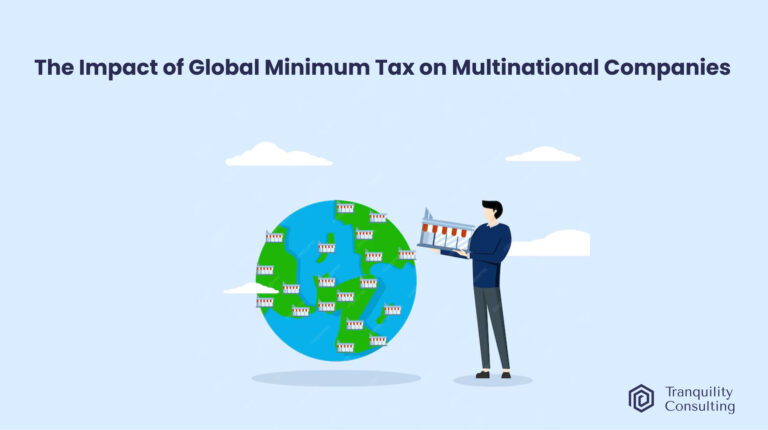In recent years, the global economic landscape has been buzzing with discussions about a groundbreaking initiative: the Global Minimum Tax. This revolutionary approach to international taxation aims to level the playing field and ensure that multinational corporations pay their fair share of taxes, regardless of where they operate. As governments worldwide grapple with the challenges of a digitalized and globalized economy, the implementation of a global minimum tax rate has emerged as a potential solution to combat tax avoidance and promote fiscal equity.
Understanding the Global Minimum Tax
The concept of a global minimum tax, spearheaded by the Organization for Economic Cooperation and Development (OECD), proposes a minimum corporate tax rate of 15% to be applied to large multinational enterprises (MNEs) with annual revenues exceeding €750 million. This initiative, part of the broader OECD/G20 Inclusive Framework on Base Erosion and Profit Shifting (BEPS), aims to address the longstanding issue of corporate tax avoidance and ensure that profits are taxed where economic activities occur and value is created.
Key Features of the Global Minimum Tax
- 15% Minimum Rate: The agreed-upon minimum tax rate of 15% applies to the global income of large multinational companies.
- Top-Up Tax Mechanism: If a company’s effective tax rate in a particular jurisdiction falls below 15%, its home country can impose a top-up tax to reach the minimum rate.
- Substance-Based Carve-Out: Allows for a portion of income to be excluded from the minimum tax calculation based on tangible assets and payroll in a jurisdiction.
- Subject to Tax Rule (STTR): Enables source countries to impose limited source taxation on certain related-party payments subject to tax below a minimum rate.
Why was the Global Minimum Tax Introduced?
Multinational corporations have long used tax avoidance strategies to exploit gaps and mismatches in different countries’ tax rules. By shifting profits to low-tax jurisdictions, many companies have successfully reduced their tax bills, leading to a “race to the bottom” in corporate tax rates globally. This has deprived governments of significant tax revenues that could be used for public infrastructure, health, and education.
The OECD’s Base Erosion and Profit Shifting (BEPS) project and the GMT proposal aim to create a fairer tax system. It seeks to:
- Reduce tax competition between countries.
- Curb profit shifting to low-tax countries.
- Increase tax transparency for multinational companies.
Impact on Multinational Companies
The introduction of the Global Minimum Tax will have a profound impact on how multinational companies operate, structure their finances, and pay taxes. Let’s explore some of the key impacts:
1. Increase in Tax Liabilities
Multinational companies that have traditionally benefited from low-tax jurisdictions will likely face higher tax liabilities. The 15% minimum tax rate eliminates the ability to reduce taxes to near-zero levels by shifting profits to tax havens. This could lead to:
- Reduced net profits: Companies will have to pay a larger portion of their profits in taxes.
- Lower shareholder returns: Higher tax liabilities could lead to lower dividends and stock buybacks.
2. Reevaluation of Tax Strategies
The Global Minimum Tax forces companies to rethink their tax strategies. Multinational companies will have to assess whether their existing tax arrangements are sustainable under the new rules. This will involve:
- Restructuring of global operations: Companies may consolidate operations in higher-tax jurisdictions if the advantages of low-tax countries diminish.
- Increased compliance costs: The need for enhanced reporting and tax compliance could raise administrative costs for multinationals.
3. Impact on Investment Decisions
With the introduction of the Global Minimum Tax, countries that offer low corporate tax rates may no longer attract the same level of foreign investment. Multinational companies that have established subsidiaries in tax havens may reconsider their investment strategies, leading to:
- Reduced foreign direct investment (FDI): Low-tax jurisdictions could see a decline in investment inflows as the tax advantages diminish.
- Shift to higher-tax economies: Companies may move investments to countries with strong infrastructure, talent pools, and market access, rather than focusing on tax benefits.
4. Greater Tax Transparency
The Global Minimum Tax will likely bring about greater tax transparency and more scrutiny of corporate tax affairs. Multinational companies will need to provide detailed information on their global tax payments and compliance. This increased transparency will:
- Enhance public accountability: Stakeholders, including shareholders, governments, and the public, will have greater insight into how much tax companies are paying and where.
- Strengthen reputational risk management: Companies will need to manage their tax affairs carefully to avoid reputational damage due to perceived tax avoidance.
5. Potential for Double Taxation
One of the concerns with the implementation of the Global Minimum Tax is the risk of double taxation. If multiple countries apply their own minimum taxes, a company could end up paying tax on the same profits in more than one jurisdiction. This could result in:
- Increased complexity in tax compliance: Navigating different countries’ tax laws and avoiding double taxation will become more challenging.
- Need for multilateral tax agreements: Countries may need to negotiate agreements to prevent double taxation and streamline the tax compliance process.
Challenges of GMT
While the global minimum tax aims to create a fairer international tax system, its implementation is not without challenges:
1. Global Cooperation and Implementation
The success of the global minimum tax hinges on widespread adoption and consistent implementation across countries. Challenges include:
- Ensuring all major economies participate to avoid creating new tax havens
- Harmonizing domestic tax laws with the global minimum tax framework
- Addressing potential conflicts with existing tax treaties and bilateral agreements
2. Technical Complexities
The calculation and application of the global minimum tax involve complex technical aspects, including:
- Determining the appropriate tax base
- Applying the substance-based carve-out
- Addressing currency fluctuations and timing differences
3. Impact on Developing Countries
While the global minimum tax aims to benefit all countries, there are concerns about its impact on developing nations:
- Some argue it may limit their ability to attract foreign investment through tax incentives
- Others suggest it could increase tax revenues for developing countries by reducing profit shifting
4. Interaction with Domestic Tax Policies
Countries will need to consider how the global minimum tax interacts with their existing tax systems, including:
- Corporate tax rates
- Tax credits and incentives
- Controlled foreign company (CFC) rules
Preparing for the Global Minimum Tax
As the implementation of the global minimum tax approaches, multinational companies should take proactive steps to prepare:
- Conduct Impact Assessments: Analyze the potential financial and operational impacts of the global minimum tax on your business.
- Review Global Structures: Evaluate existing corporate structures and consider potential reorganizations to optimize tax efficiency within the new framework.
- Enhance Tax Technology and Data Management: Invest in robust systems to track global income and calculate effective tax rates across jurisdictions.
- Engage with Stakeholders: Communicate with investors, board members, and other stakeholders about the potential impacts of the global minimum tax on the company’s financial performance.
- Monitor Developments: Stay informed about the ongoing discussions and implementation progress of the global minimum tax initiative.
Conclusion
The Global Minimum Tax marks a new era in international taxation, aiming to create a fairer tax system and curb tax avoidance. While it presents challenges for multinational companies, such as increased tax liabilities and compliance costs, it also offers opportunities for companies to optimize their global operations, enhance transparency, and contribute to a more equitable global economy. As the implementation of the Global Minimum Tax progresses, multinationals will need to stay informed and adapt their tax strategies to thrive in this evolving landscape.
FAQ
- What is the Global Minimum Tax?
- The Global Minimum Tax is a 15% corporate tax rate on large multinational companies to prevent profit shifting to low-tax jurisdictions.
- Who will be affected by the Global Minimum Tax?
- Multinational companies with annual revenues exceeding €750 million will be subject to the 15% minimum tax.
- Why was the Global Minimum Tax introduced?
- It was introduced to combat tax avoidance by ensuring that profits are taxed where economic activities occur, curbing profit shifting.
- How will the Global Minimum Tax impact multinational corporations?
- It may increase tax liabilities, force reevaluation of tax strategies, and affect investment decisions, especially in low-tax countries.
- What is the top-up tax in the Global Minimum Tax?
- If a multinational’s effective tax rate in a jurisdiction is below 15%, its home country can impose a top-up tax to meet the global minimum rate.
If you have any questions or need business-related tax consulting advice, please contact us at: [email protected]





